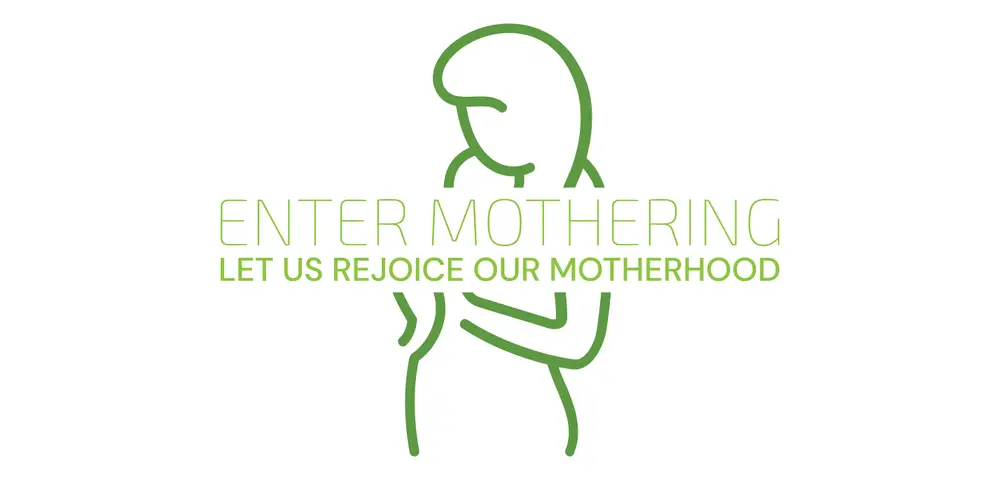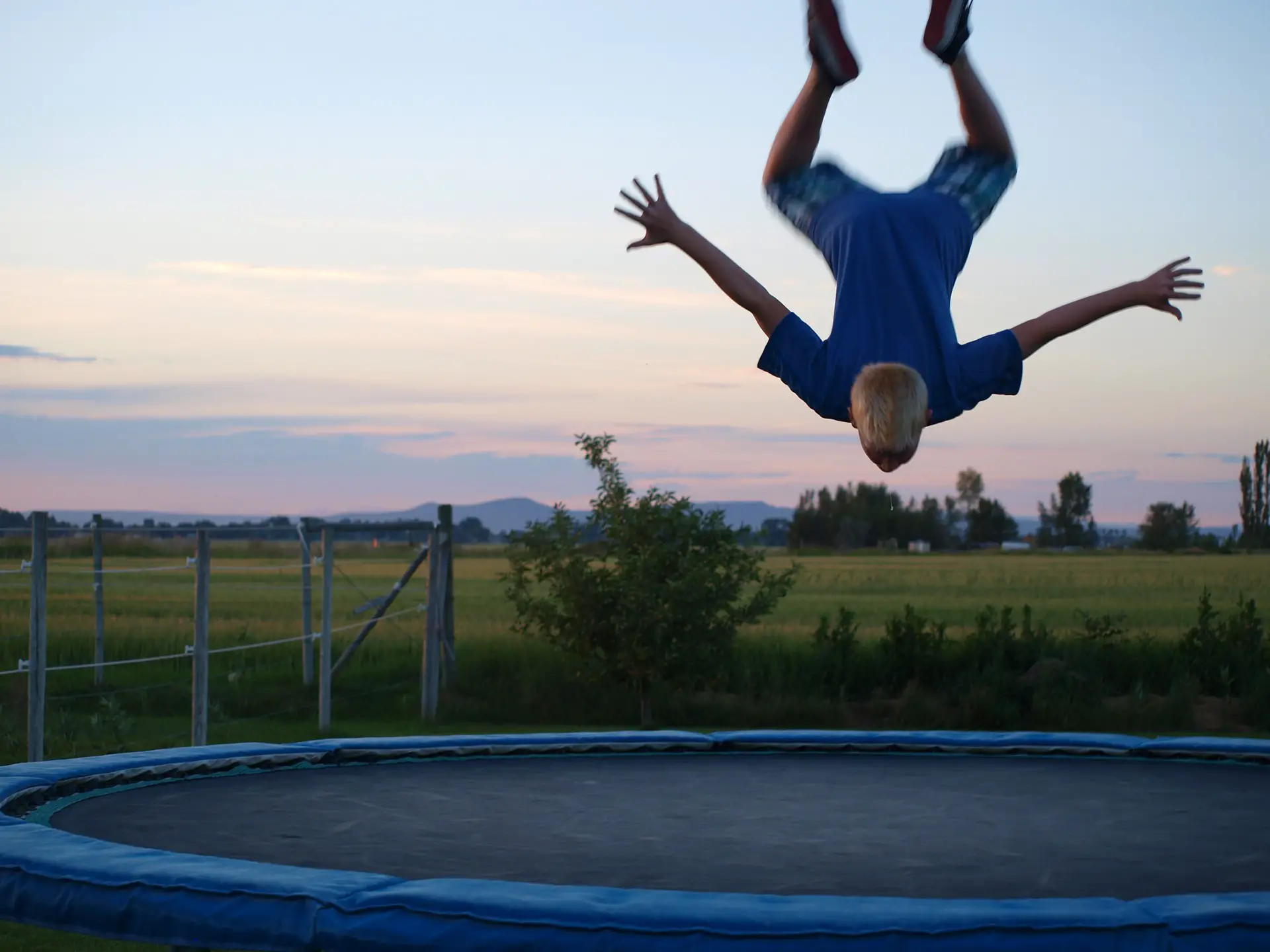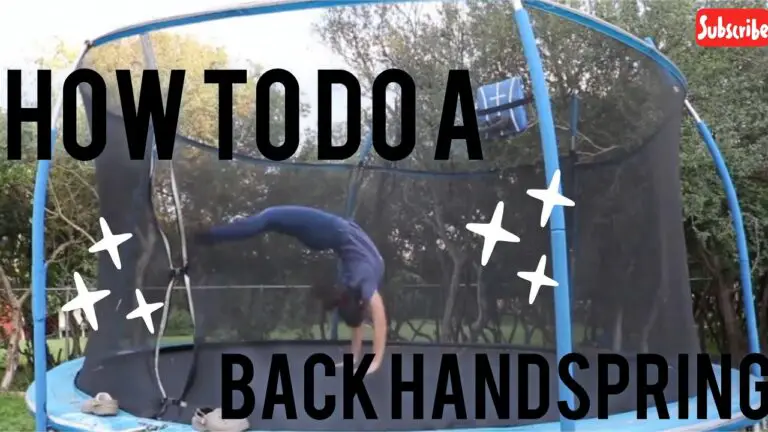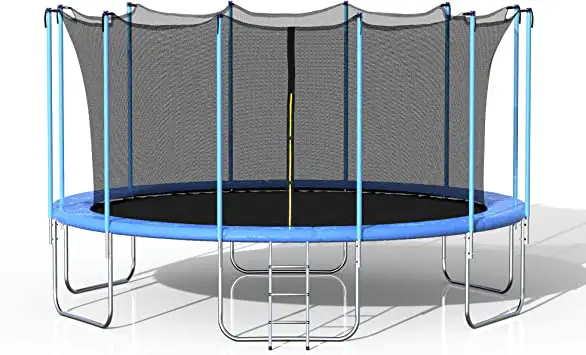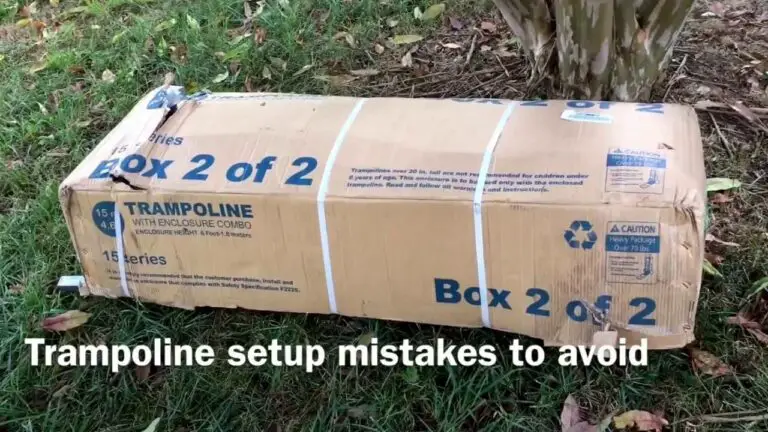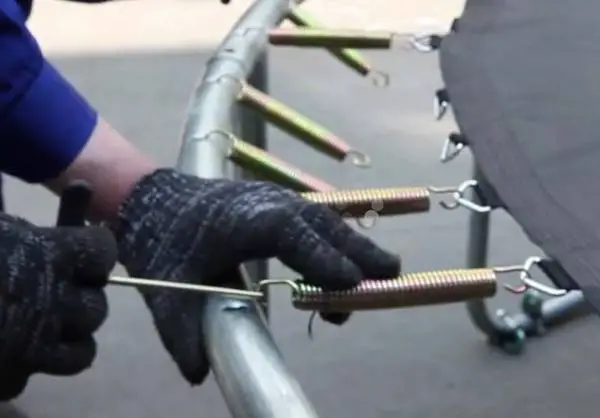If you land on your neck while bouncing on a trampoline, there are a few things you can do to minimize the risk of injury. First, try to keep your head and neck in alignment with your spine. Second, use your hands to support your head and neck.
Third, avoid hyperextending your neck. Finally, seek medical attention if you experience any pain or symptoms after landing on your neck.
If you’ve ever landed on your neck while trampolining, you know it can be a scary experience. Here’s what to do if it happens to you:
First, try to stay calm.
It’s important not to panic, as this can make the situation worse. If you can, slowly roll onto your side or stomach. This will help take the pressure off of your neck and make it easier to breathe.
If you’re feeling any pain in your neck or head, it’s important to seek medical attention right away. Even if you don’t think the injury is serious, it’s always better to err on the side of caution and get checked out by a doctor.
Once you’re home from the hospital or doctor’s office, there are some things you can do to help speed up the healing process.
Apply ice to the injured area for 20 minutes at a time, several times per day. You can also take over-the-counter pain medication like ibuprofen to help reduce inflammation and pain.
Finally, be sure to rest and avoid activities that could jar or jolt your neck for at least a week or so.
Once the initial healing period has passed, gradually start adding some gentle stretching and exercises into your routine as recommended by your doctor.
worst trampoline accident ever (broken neck)
How Do I Know If My Neck Injury is Serious
If you’re wondering how to know if your neck injury is serious, there are a few things you can look for. First, if you have any pain or tenderness in your neck, it’s likely that something is wrong. Second, if you have difficulty moving your head or neck, or if your range of motion is limited, this could be a sign of a serious problem.
Finally, if you experience any numbness, tingling, or weakness in your arms or legs, it’s important to seek medical attention right away as this could be a sign of nerve damage. If you’re ever unsure about the severity of your neck injury, it’s always best to err on the side of caution and see a doctor.
Hyperflexion of the Neck Treatment
If you have hyperflexion of the neck, there are a few things that can help. First, your doctor may recommend physical therapy to help improve your range of motion. You may also be given exercises to do at home to help stretch and strengthen your neck muscles.
In some cases, surgery may be necessary to correct the problem.
Trampoline Neck Injury Symptoms
A trampoline neck injury can be a very serious matter. Symptoms of a trampoline neck injury can include pain in the neck, back, or head, as well as dizziness, blurred vision, and nausea. If you or your child has any of these symptoms after bouncing on a trampoline, it is important to seek medical attention immediately.
Atrampoline neck injury can occur when the head and neck are forced into an extended position for a prolonged period of time while bouncing. This can cause the muscles and ligaments in the neck to become stretched or torn. In some cases, the spinal cord may also be injured.
While most trampoline neck injuries are not life-threatening, they can cause significant pain and discomfort and may require surgery to repair.
Hyperextension of the Neck Symptoms
If you have hyperextension of the neck, it means that your head is extended too far backward. This can happen suddenly, such as from a car accident, or it can develop slowly over time. Symptoms of hyperextension of the neck include pain in the back of the neck, headaches, dizziness, and numbness or tingling in the arms.
If you have any of these symptoms, it’s important to see a doctor right away. Hyperextension of the neck can cause serious problems if not treated properly.
I Landed on My Neck And Now My Back Hurts
If you’ve ever fallen and landed on your neck, you know how much it can hurt. And if the fall was severe enough, you may have even suffered a spinal cord injury. But even if the fall didn’t cause a serious injury, you may still be dealing with pain in your back and neck.
There are a few things that can cause this pain. First, if you landed on your head or neck at an awkward angle, you may have strained some muscles or ligaments. Second, if the fall was hard enough, it could have caused some of the bones in your spine to compress or fracture.
And lastly, if you hit your head during the fall, you could be dealing with a concussion or other type of brain injury.
So what should you do if you find yourself in this situation? If the pain is severe, it’s always best to see a doctor right away.
They will be able to rule out any serious injuries and give you specific instructions on how to treat the pain. For more minor cases of back and neck pain after a fall, over-the-counter painkillers like ibuprofen or acetaminophen can help. You can also apply ice to the area for 20 minutes at a time several times per day.
Just be sure to wrap the ice in a towel so that you don’t cause any further damage to your skin.
If the pain persists for more than a few days or gets worse instead of better, it’s time to see a doctor so they can figure out what’s going on and get you started on the road to recovery!
What Happens If You Get Hit in the Back of the Neck
If you’re lucky, nothing more than a bruise. If you’re not, a hit to the back of the neck can be incredibly dangerous. The spinal cord is located in the back of the neck, and even a small impact can cause serious damage.
There are a number of things that can happen if you get hit in the back of the neck. The most minor injury is a bruised or cracked bone. This can be extremely painful, but it usually isn’t life-threatening.
More serious injuries include damaged vertebrae or disks. These injuries can pinch or compress the spinal cord, causing paralysis below the point of injury. In some cases, this paralysis is temporary and will eventually heal on its own.
However, in other cases it can be permanent.
The most severe injury that can occur from a blow to the back of the neck is severing or tearing of the spinal cord itself. This is obviously incredibly dangerous and can lead to death or complete paralysis below the point of injury.
Even if you survive such an injury, your quality of life will likely be greatly diminished.
What Happens If You Get Hit in the Side of the Neck
Most people don’t know this, but if you get hit in the side of the neck, it can be extremely dangerous. The reason for this is because the carotid artery is located in this area. If this artery is damaged, it can cause a stroke or even death.
So what should you do if you are hit in this area? First, it is important to seek medical attention immediately. Even if you feel fine, it is still possible that there is internal damage that needs to be treated.
If you are able to, apply pressure to the wound and keep your head elevated. This will help reduce the risk of further damage to the artery.
It is also important to avoid moving your head too much.
This can make any existing damage worse and also increase your risk of stroke or death. So if you are hit in the side of the neck, stay calm and wait for medical help to arrive.
Is Getting Hit in the Neck Dangerous
There are a lot of myths out there about getting hit in the neck. Some people think that it’s not dangerous at all, while others believe that it can be deadly. So, what’s the truth?
Is getting hit in the neck dangerous?
The answer is both yes and no. It depends on how hard you’re hit, and what part of the neck you’re hit in.
A light tap to the front of the neck probably won’t do much damage, but a hard blow to the back of the neck could cause serious injury or even death.
So, if you’re ever in a situation where someone is hitting you in the neck, it’s important to pay attention to how hard they’re hitting and where they’re hitting you. If they seem like they might be trying to hurt you seriously, it’s best to get away from them as quickly as possible.

Credit: www.cbc.ca
What Happens When You Land on Your Neck on a Trampoline?
If you land on your neck while jumping on a trampoline, it is possible to break your neck. This is most likely to happen if you are not using proper form and technique when jumping. Always make sure to keep your head up and look straight ahead when jumping, and land in the center of the trampoline.
If you do happen to land on your neck, seek medical attention immediately as this could be a very serious injury.
How Do You Know If a Neck Injury is Serious?
If you have any pain, numbness, or tingling in your neck, it’s important to see a doctor right away. These could be signs of a serious neck injury. Other symptoms of a serious neck injury include:
-loss of feeling in your arms or legs
-paralysis
-inability to move your head or neck
-severe headache
-nausea or vomiting
If you have any of these symptoms, it’s important to see a doctor right away.
Aneck injury can be very serious and even life-threatening.
What to Do If You Landed on Your Neck?
If you have landed on your neck, there are a few things you can do to help ease the pain. First, try to remain calm and avoid any sudden movements. If you are able, slowly move your head to the side to relieve any pressure on your neck.
You can also try applying ice or a cold compress to the area to help reduce swelling. If the pain is severe, however, it is best to seek medical attention immediately. In some cases, landing on your neck can cause serious injuries such as spinal cord damage or even paralysis.
Can Trampolines Cause Neck Pain?
While trampolines are a lot of fun, they can also cause neck pain. This is because when you land on the trampoline, your head and neck can be jarred. This can lead to whiplash or other neck injuries.
If you do experience neck pain after using a trampoline, see a doctor right away.
Conclusion
If you land on your neck while trampolining, it is important to seek medical attention immediately. This is because there is a risk of serious injury, including paralysis or death. If you are with someone who has landed on their neck, it is important to keep them still and call 911.
